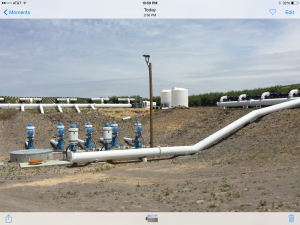
Ordinarily, all the Oakdale Irrigation District (OID) needs to do to spin the news is have its $160 an hour PR firm prepare a press release which is then picked up by the Oakdale Leader and printed nearly verbatim. That strategy fell apart last Tuesday, when The Valley Citizen revealed OID’s secret water sale.
Not much later, OID General Manager Steve Knell responded candidly when Modesto Bee reporter Garth Stapley inquired about reasons for the secrecy:
“It would not be good politics for us (to discuss publicly) because people are going to ask questions. We agreed we would do it all at Tri-Dam,” said Knell.
It’s not difficult to imagine what kind of questions Knell and company would like to avoid.
For one thing, local rice farmer Bob Frobose and others have been saying for months that OID always had more than enough water to avoid reducing allotments, but reduced allotments anyway so it could sell water later in the year. Linda Santos, a candidate for a seat on the OID Board of Directors, has said the OID continues to pump record amounts of groundwater so that it can sell surface water outside the district.
An OID press release claims the sale helps farmers and fish, but in an open forum it would have to deal with plenty of complaints from both fishermen and farmers.
Two farmers who were livid about the sale are Jim DeMartini and Terry Withrow. Both also happen to be Stanislaus County Supervisors.
“With the (OID) board operating in secret and not being truthful in presentations, I’ll have a hard time believing anything they say anymore,” said DeMartini to Stapley.
Supervisor Withrow has been meeting regularly with OID management, trying to discover ways to deliver water to local farmers willing to pay far more for water than Trinitas Partners, whose 7,200 acres were recently annexed into OID. He was shocked to learn of the water sale. Farmers in the San Joaquin Delta will also be angry to learn that much needed fresh water for their own farms will once again be sent south to corporate farmers with deeper pockets.
And while many fishermen will be happy when OID sends water down the Stanislaus River, none will be pleased when the water is diverted away from Delta, where increasing salinity threatens not only fisheries but the entire ecosystem.
One of the most difficult questions for Mr. Knell and his secretive board will be why Trinitas Partners was willing to approve the water sale. In just one of many puzzling elements in its contract with OID, Trinitas was given rights of approval for sales outside the OID. Earlier this year, farmers with senior water rights were incensed when their allotments were cut and Trinitas received ten inches of OID water.
Ten inches of surface water, however, doesn’t begin to cover requirements for Trinitas’ thousands of acres of thirsty nut trees, almost all of which depend on groundwater. Why then, would Trinitas sign off on a sale of water that could be used in its own orchards?
Farmers close to OID canals that service Trinitas’ orchards are saying Trinitas just received a big gulp of surface water. Whether the delivery was part of Trinitas’ ten inch allotment is another question for OID.
It’s no wonder OID Directors and management want to avoid inquiry. But given today’s realities of instantaneous news through social media, they won’t be ducking such questions much longer, unless, that is, they wish those questions answered by others than themselves.

Need to be on your mailer list. Please. Mike
It’s worth noting that USBR, in operating New Melones, is on the hook for delivering 23,000 AF for a fish pulse flow in October as per the Biological Opinion. It certainly behooves the irrigation districts to make the claim that this is “their” water and reap the benefits of the sale. The alternative would be for them to fight USBR, sue, or withhold the water at Goodwin, and to lose the water with no financial benefit.
Interesting pseudonym.
So Eric – name that poster … Whose pseudonym is David Brower?
We need to follow all of the money that has changed hands. There is a logical explanation for everything that happens. Given how cheaply the water was sold to customers outside the district compared to other offers previously made public in other area water deals, did any money change hands “off the books”? Who was the water sold to? Were the customers the same as in prior years?
Except for the apparent public deception about the existence of the water sale, every transaction may have been done legally. There is no crime for entering into a bad deal. However, because of the secrecy involved, the transactions need to be heavily scrutinized by an independent auditor.
If the promises of El Nino do not materialize this winter, who is going to suffer most from the greater allocation cutbacks that will be needed next year? Will there be any more (secret) outside water sales because of an existing contract that we don’t know about?
Follow the money trail.